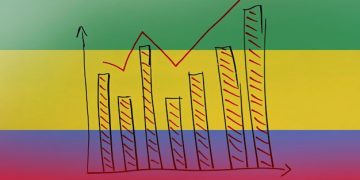How 3.2% Inflation in 2025 Will Reshape Your Budget

How Will the Projected 3.2% Inflation Rate in 2025 Impact Your Personal Budget? The anticipated 3.2% inflation rate in 2025 is poised to affect consumer spending and saving habits; understanding these potential effects is crucial for adapting your financial strategies and maintaining your purchasing power.
Navigating the future requires a clear understanding of economic forecasts, particularly those concerning inflation. The projected 3.2% inflation rate in 2025 is more than just a number; it’s a potential shaper of your financial reality. Let’s delve into how will the projected 3.2% inflation rate in 2025 impact your personal budget? and what you can do to prepare.
Understanding the 2025 Inflation Forecast
Predicting inflation is a complex task, but economic forecasts provide a valuable baseline for financial planning. The projected 3.2% inflation rate for 2025 suggests a continued increase in the general price level of goods and services. This isn’t just an abstract concept; it directly influences what you’ll be able to afford.
Several factors contribute to inflation forecasts, including economic growth, monetary policy, and global events. Understanding these underlying forces helps contextualize the 3.2% figure and allows for a more nuanced approach to budgeting.
Key Inflation Drivers
Several factors can influence inflation rates. These drivers are crucial to understanding the dynamics of inflation and how it might affect your finances.
- Monetary Policy: The Federal Reserve’s decisions on interest rates significantly impact inflation. Lower interest rates can stimulate borrowing and spending, potentially leading to higher inflation.
- Supply Chain Disruptions: Global events like pandemics or trade wars can disrupt supply chains, leading to scarcity and higher prices.
- Wage Growth: Rising wages can increase demand and prices, contributing to inflationary pressures.
Staying informed about these factors can help you anticipate future inflation trends and adjust your financial strategies accordingly.
In summary, the 2025 inflation forecast serves as a warning of potential changes in our purchasing power. Staying informed and strategically adapting your financial plans can soften the effects. Recognizing what influences inflation and what actions can be taken in response leads to more effective money management.
Impact on Household Expenses
The most immediate effect of a 3.2% inflation rate is on your day-to-day expenses. From groceries to gas, you’ll likely notice that your dollars don’t stretch as far as they used to. This necessitates a closer look at your spending habits and potential adjustments to your budget.
Consider the essential components of your budget: housing, transportation, food, and healthcare. How might each of these be impacted by inflation, and what adjustments can you make to mitigate the effects?

Essential Spending Categories
Inflation impacts various spending categories differently. Understanding this variation is key to making informed budgetary decisions.
- Food: Grocery prices tend to rise noticeably during inflationary periods. Strategies like meal planning, buying in bulk, and choosing store brands can help mitigate costs.
- Transportation: Gas prices are particularly susceptible to inflation. Consider public transport, carpooling, or cycling to save money.
- Housing: Rent and mortgage payments may increase. Negotiate terms or consider downsizing if possible.
By carefully analyzing and optimizing your spending in these key areas, you can reduce the pinch of inflation on your household budget.
In conclusion, the inflationary climate of 2025 will affect average household costs differently; some sectors and expenses will go up more than others. Analyzing expenses and being creative with spending patterns can counter the potentially negative effect.
Strategies for Budget Adjustment
Once you understand where inflation is hitting hardest, it’s time to implement strategies to adjust your budget. This isn’t just about cutting costs; it’s about making smarter financial decisions that align with your long-term goals.
Prioritize your needs over wants, and identify areas where you can reduce discretionary spending. Explore alternative options for essential expenses, such as negotiating bills or switching providers.
Budgeting Techniques for Inflation
Various budgeting strategies can help you navigate inflationary times. Choosing the right approach depends on your personal preferences and financial situation.
- Zero-Based Budgeting: Allocate every dollar you earn to a specific purpose, ensuring that your income equals your expenses.
- 50/30/20 Rule: Allocate 50% of your income to needs, 30% to wants, and 20% to savings and debt repayment.
- Envelope System: Use physical envelopes to allocate cash for different spending categories, helping you stay within budget.
Experiment with these techniques to find the one that best suits your lifestyle and financial goals.
To summarize, adjusting your spending habits and applying effective strategies can counter the negative influence of these financial changes. Being flexible with your income and willing to adapt when necessary can greatly improve a budget’s overall resilience.
Investing to Outpace Inflation
While budgeting helps manage your current expenses, investing is crucial for long-term financial security. The goal is to find investments that offer returns higher than the inflation rate, preserving and growing your wealth over time.
Consider diversifying your portfolio with assets that have historically performed well during inflationary periods, such as real estate, commodities, or inflation-indexed securities. Consult with a financial advisor to determine the best investment strategy for your risk tolerance and financial goals.

Investment Options to Combat Inflation
Choosing the right investments can help safeguard your wealth during inflationary periods. Each option comes with its own set of risks and rewards.
- Stocks: Equities can offer high returns, but they also come with higher volatility. Focus on companies with strong pricing power.
- Real Estate: Historically, real estate has been a good hedge against inflation, as property values and rental income tend to rise with prices.
- Commodities: Precious metals like gold and silver are often seen as safe havens during inflationary times.
Diversification across these asset classes can help balance risk and maximize returns.
In short, investing wisely is a necessary procedure for long-term financial security. While this may seem like a complex topic, educating yourself and finding the right expert can result in positive financial outcomes.
Negotiating Income and Benefits
In an inflationary environment, your income needs to keep pace with rising prices to maintain your standard of living. Don’t hesitate to negotiate a raise or explore opportunities for additional income.
Research industry benchmarks for salaries and benefits, and be prepared to articulate the value you bring to your employer. Consider exploring side hustles or freelance work to supplement your income and diversify your revenue streams.
Strategies for Increasing Income
Negotiating a raise or finding additional income streams can help offset the effects of inflation. Here are some strategies to consider:
- Salary Negotiation: Research industry standards, highlight your achievements, and confidently request a raise.
- Side Hustles: Explore freelance work, online platforms, or other opportunities to earn additional income in your spare time.
- Skill Development: Invest in training or certifications that can increase your value to employers and open doors to higher-paying jobs.
Taking proactive steps to increase your income can help you stay ahead of inflation and achieve your financial goals.
In conclusion, keeping up with the economic changes around you can lead to the best financial outcomes. Negotiating a raise or finding alternative sources of income can make great strides towards maintaining your current quality of life.
Long-Term Financial Planning Considerations
Inflation doesn’t just impact your immediate budget; it also has implications for your long-term financial goals, such as retirement planning. The higher the inflation rate, the more you’ll need to save to maintain your purchasing power in the future.
Revisit your retirement projections and adjust your savings goals accordingly. Consider delaying retirement or increasing your contributions to retirement accounts to ensure you have enough to live comfortably throughout your golden years.
Adjusting Long-Term Financial Goals
Inflation can significantly impact your long-term financial plans. Here’s how to adjust your strategies:
- Retirement Planning: Increase contributions to retirement accounts and consider delaying retirement to allow your savings to grow.
- Savings Goals: Adjust your savings targets for major purchases like a home or car to account for rising prices.
- Debt Management: Prioritize paying down high-interest debt to reduce the impact of inflation on your overall financial health.
Proactive planning can help you stay on track toward achieving your long-term financial goals.
In closing, planning ahead and setting goals is the key to success. It allows for flexibility and change while maintaining your initial trajectory.
| Key Point | Brief Description |
|---|---|
| 💰 Impact on Expenses | Rising prices affect daily needs like groceries, gas, and housing. |
| 📈 Investing Strategies | Consider stocks, real estate, and commodities to outpace inflation. |
| 💼 Income Negotiation | Negotiate a raise or find side hustles to boost your income. |
| 🎯 Long-Term Planning | Adjust retirement and savings goals to maintain future purchasing power. |
Frequently Asked Questions
▼
Inflation can be caused by increased demand, supply shortages, or monetary policy decisions that increase the money supply. All of these factors generally lead to higher prices.
▼
If the interest rate on your savings account is lower than the inflation rate, the real value of your savings decreases over time. Your money loses purchasing power.
▼
The Federal Reserve uses monetary policy tools, like adjusting interest rates, to manage inflation and keep the economy stable. Raising rates can curb inflation.
▼
Yes, diversifying your portfolio with assets like real estate, commodities, and inflation-indexed securities can help protect your investments from the effects of inflation.
▼
It’s wise to review your budget monthly or quarterly during inflationary periods to adjust for rising prices and ensure your financial plan remains effective. Small changes matter.
Conclusion
In summary, a projected 3.2% inflation rate in 2025 will undoubtedly impact personal budgets across the US. However, by understanding its causes, planning ahead, and taking proactive steps to adjust spending, income, and investments, individuals can successfully navigate these financial challenges and maintain their long-term financial well-being.





